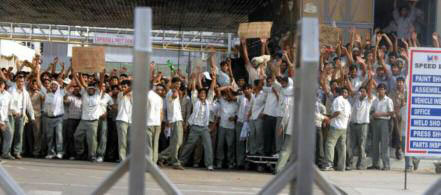
 |
FIGHT FOR COMMUNISM! |
International Communist Workers Party | |
One of the reasons to abolish the wage system is that it creates profits. The profits (technically speaking ‘surplus value’) then get divided up among bankers, land developers and industrialists.
In 2001 the auto industry began to grow in India. By 2006 a group of capitalists decided to make India a “global manufacturing hub” for autos. They saw 20% of the population - the middle class - living on about $2.50 a day. They saw millions of others subsisting below that. In other words, they saw a massive cheap labor force. But they wanted more.

They got government subsidies, tax breaks, research grants and, above all, favorable labor laws. They got, for example, legislation that made low rural wages even lower. This forced migration from the villages to the cities in search of jobs, pushing down wages even further. (NAFTA produced the same effect in Mexico helping turn it into a hub for auto manufacturing in the Americas).
Clearly workers in auto (or any industry for that matter) face a full-spectrum political attack on their wages. It can never be otherwise. Wages are central to capitalism. Without wage labor there would be no profits. Without profits there would be no capitalism.
Which brings us to another reason why we need to abolish the wage system: although it creates profits, capitalism’s laws demand maximum profits, which must be wrenched from the workers hides! This is especially true in times of world crisis. Although car production soared in India, going from 1.7 to 3.3 million in seven years, the growth did not satisfy investment capitalists. They can invest anywhere in the world and only do so where they get the maximum rate of return.
This forced the auto bosses to cut costs. And they did it by speeding up work and cutting wages. Where in 2001 the bosses and bankers got $2.63 for every $1.00 they invested in wages, by 2010 they got $6.14 for every $1.00 they invested. It was a vicious assault on an already impoverished working class. In India’ s main auto production area just outside Delhi, 80% of the 1 million workers are now hired ‘on contract’ (non-permanent), others are ‘trainees’ and still others ‘apprentices. All three categories pa y less than permanent jobs.
Of course the workers answered the attack. Between 2009 and 2012 a militant strike wave swept the industry. It came to a head with the arrest of 147 Maruti-Suzuki workers in 2012. They have been framed for the murder of a personnel manager during a strike. Although all the evidence points to their innocence (the personnel manager actually agreed to their demands) they have been held in jail for over two years without trial. In 2013 the Punjab High Court refused them bail, arguing that “foreign investors are likely not to invest money in India for fear of Labor unrest.”
The High Court harbors no illusions about it: wage labor is central to the existence of a capitalist state. But the Maruti-Suzuki workers weren’t striking against wage labor or the capitalist state. They were just striking the company they worked for, aiming to make wage labor there a little more livable. In this they were like the hundreds of thousands of auto workers who had taken part in the 2009 - 2012 strike wave.
Which brings us to the most difficult obstacle to abolishing wage slavery: the ideological hold it has over us! Because the capitalists have made us believe we can’t live without money, from continent to continent, we only fight to modify the wage system. Instead we should fight to abolish it. A global survey like this series helps make it clear that the exploitation and oppression we face are not primarily the result of a company (management), an industry (market forces) or a country (electoral parties). They are the result of a world system - capitalism. We produce all of value in society. Why, we need to ask ourselves, should we continue to produce for private profit? Why can’t we produce for social need?
We can, of course! And that’s the importance of Red Flag. Now in continent after continent it is sparking revolutionary discussions about abolishing wages and building a communist society like never before. Generally, these discussions are too small, but that only highlights the important role of you, the reader! Join ICWP, help distribute Red Flag and start the discussions where you work on abolishing the wage system and fighting for a communist world without bosses or money!